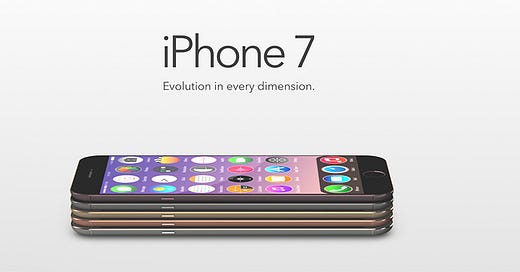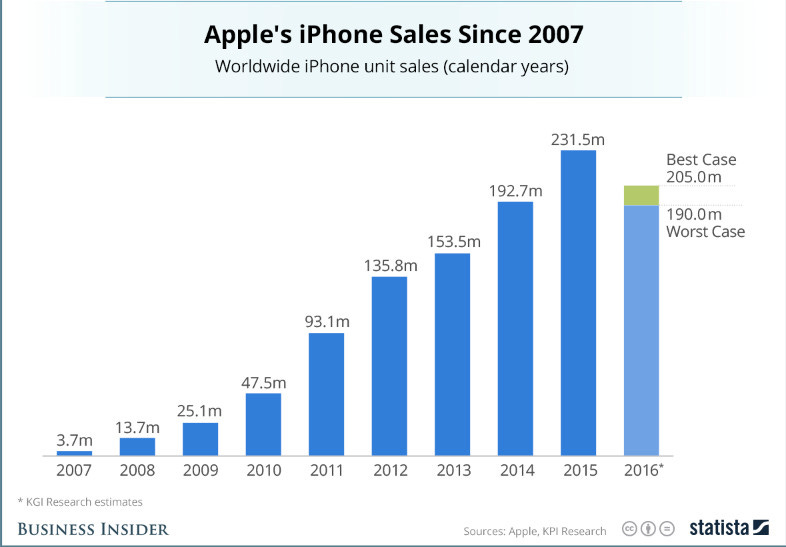How iOS allowed Apple to consistently beat its competitors
A rehash from an article I wrote back in 2016, and why it still matters today.
Apple Inc., the California-based tech giant, is the world’s largest publicly-traded corporation in terms of market capitalization Impressively, 60% of its revenues come from a single product - the iconic iPhone. The graph below shows how many iPhones have been sold worldwide since the product’s introduction in 2007:
As we can see, at the end of this year there will have been around one billion and eighty million iPhones sold. Given that they are sold for an average of ~ 650 USD each, the company has generated more than six hundred billion USD in revenues from a single device. That is an astonishingly high turnover for a single product; there’s no question that the iPhone has been extremely successful. Nonetheless, as we can also observe in the graph, 2016 has been the only time where iPhone sales will not increase in comparison to the previous year.
Technology blogger Steve Kovach claims that despite recent sales setbacks and worries from analysts about the product’s slowed growth, the iPhone “always wins” and will continue to win as long as people buy smartphones. He explains that in previous years this could have been largely due to its superior design and hardware, but that currently many rivals have been able to imitate that strategy. Kovach's main point is that the iPhone fundamentally has been so successful because of IOS, and will continue be successful because of it. In other words, the iPhone’s software is more valuable than those used by the competition, in particular because all of its biggest rivals use the same software (Android) and thus it is “nearly impossible” for one Android phone to stand out from one another. Moreover, according to Kovach, the iPhone’s differentiation strategy has also been able to be more effective due to the software's unique features, in particular its linkage with other firms. In essence, developers make more money on IOS than they do on Android or Windows, which then incentivizes them to make the best apps and newest updates for the iPhone first. This strategy, he argues, is the iPhone’s real competitive advantage.
While we believe that all of this is a crucial component of the phone’s differentiation strategy, we also think that the entire company’s marketing and advertising approach has been a major driver in differentiating itself successfully. According to renowned biographer Walter Isaacson, Steve Jobs was obsessed with design - more specifically a simplistic yet elegant and highly functional design some call “minimalism.” It is no coincidence that the company hired the former CEO of the fashion giant Burberry, Angela Ahrendts as a Vice-President of retailing operations, and it also has a very influential management role titled Chief Design Officer (CDO) comprised of Jonathan Ive, a British industrial designer credited of being the designer of the iPod, MacBooks, iPads, the Apple Watch and the iPhone. This is a management position that Google does not have, for instance, and neither does Samsung.
Hence, we can see that a a strong focus on design has been crucial for the success of the iPhone. This can be further observed in the product’s newest promotional video for the new iPhone 7 and iPhone 7 +, in which the company also announces that it decided to remove the headphone jack - a decision which gained some criticism for being unnecessary and impractical, but which has also gained some praise for the simplistic design that Apple is so strongly associated with. What is certain, though, is that the removal of the headphone jack has been controversial, a move that the company’s marketing chief Phil Schiller even called “courageous.” This, however, did not come as a surprise for many that have been following the strategies of the company for many years. Apple's newest Macbook computers, for instance, which were released last year, come only with a single external port, a move which may seem inconvenient to some customers and even some rivals, but which is in line with the company’s philosophy. The iPhone 7 has certainly continued with this differentiation strategy of “simplicity” and “elegance,” which can be seen narrated in their latest ad by its design officer, Jonny Ive.
Another relevant current development to mention is that the company’s biggest competitor, Samsung, is going through a tumultuous time, just when their phone sales were starting to show signs of competing neck-to-neck with the iPhone. Samsung has recalled more than 2 million phones worldwide, and analysts estimated that just in the short run this will cost the company around $3 billion. This, however, is not taking into consideration the loss of reputation and reliability for the brand, something which will likely increase even further the iPhone’s competitive advantage.
In conclusion, it is clear that for many, in particular in the North American market, that the iPhone has been perceived as more reliable, better designed, and an overall more appealing product than the rest. The question remains whether the recent sales slump is a bellwether of decreasing demand, and therefore a potential signal to re-think their strategy, or whether it is just an anomaly. The company has not released any official numbers yet, but companies such as Sprint and T-Mobile have stated that the demand for new iPhones has been "the highest ever."A clearer picture will arise when the company releases its Q4 financial reports.
Discussion questions
Does Apple’s product differentiation strategy lead them towards a competitive advantage? If yes, is it temporary or sustainable?
What is the iPhone’s main differentiation strategy that has allowed it to be so successful?
How much do you think Samsung's scandal will help with improving the iPhone's recently decreasing sales?
Given that their sales have somewhat decreased, is it time to pursue a different differentiation strategy?
Sources:
http://www.theverge.com/2016/7/26/12289832/apple-iphone-sales-q3-2016
http://www.businessinsider.com/apple-iphone-sales-by-year-2016-4
http://www.forbes.com/sites/jvchamary/2016/09/16/apple-iphone-headphone-jack/#1d0c118b3019
http://fortune.com/2016/09/26/apple-iphone-7-headphone-jack/
http://www.theverge.com/2016/9/7/12838024/apple-iphone-7-plus-headphone-jack-removal-courage
http://www.cbsnews.com/news/samsung-recalls-galaxy-note-7-after-battery-explosions/




